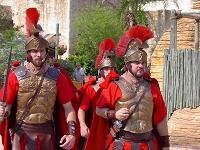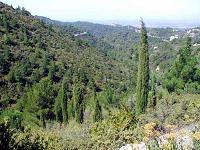|
 Archeological finds at the Gardiki castle in the middle of the island show that humans lived on the islands from 40.000 BC or earlier, and at Sidari, on the northwest coast, a settlement has been uncovered that probably dates back to 7000 BC. Several settlements from the Bronze Age, starting from 2000 BC, have also been found. From the 8th century BC and onwards the island has been colonized by several people, amongst which the Corinthians
Over a period of more than four centuries (the 14th until the 18th century AD) Corfu was a part of the empire of Venice. Because of this the Venetian influence is very big. After this France and later Great Brittain occupied the island for a while, after which it became part of modern Greece. Amongst other things the rulers have left their mark on the architecture on the island of Corfu. One of the most important tourist attractions is the Achilleion, a palace that was build between 1890 and 1892 for the Empress Elisabeth of Austria (Sisi). The neoclassical building was given this name by the empress herself in honour of the classical hero of Achilles.
Archeological finds at the Gardiki castle in the middle of the island show that humans lived on the islands from 40.000 BC or earlier, and at Sidari, on the northwest coast, a settlement has been uncovered that probably dates back to 7000 BC. Several settlements from the Bronze Age, starting from 2000 BC, have also been found. From the 8th century BC and onwards the island has been colonized by several people, amongst which the Corinthians
Over a period of more than four centuries (the 14th until the 18th century AD) Corfu was a part of the empire of Venice. Because of this the Venetian influence is very big. After this France and later Great Brittain occupied the island for a while, after which it became part of modern Greece. Amongst other things the rulers have left their mark on the architecture on the island of Corfu. One of the most important tourist attractions is the Achilleion, a palace that was build between 1890 and 1892 for the Empress Elisabeth of Austria (Sisi). The neoclassical building was given this name by the empress herself in honour of the classical hero of Achilles.
 An important difference between Corfu and other large parts of Greece is that the island has never been occupied by the Turks. This is noticable in at least two ways:
An important difference between Corfu and other large parts of Greece is that the island has never been occupied by the Turks. This is noticable in at least two ways:
On Corfu there are still large numbers of cypress trees; these trees have been cut down in other parts of Greece because the Turks believed that the trees brought bad luck.
On Corfu there are no blue and white painted houses. On many other Greek places many houses have been painted in these Greek colors as a protest against the Turks because they were not allowed to use the Greek flag.
The Venetians made Corfu their most important arms/weapon center and build many fortresses and because of this the islanders could withstand the repeated attacks of the Turkish army in the 15th and the 18th century.
|









